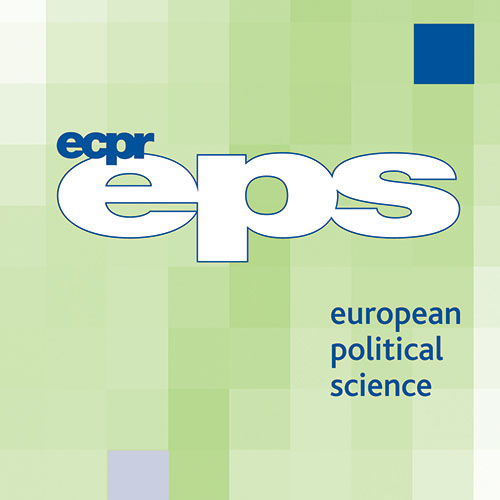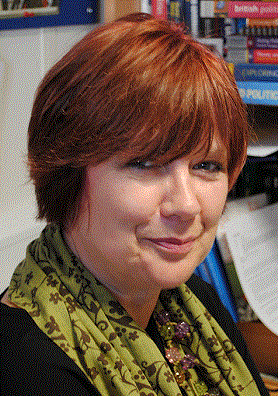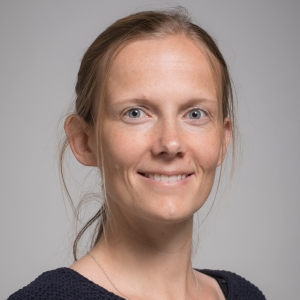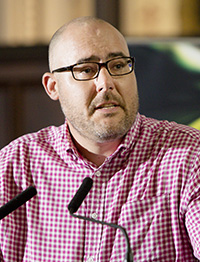Install this application on your home screen for quick and easy access when you’re on the go.
Just tap then “Add to Home Screen”

The Jacqui Briggs EPS Prize is awarded annually for the best article appearing in the previous year’s volume of the ECPR's professional journal, European Political Science (EPS).
The prize is given to an article that makes a substantial contribution to the field of political science, especially articles that contribute to the understanding of new and innovative trends in political science or to innovative approaches to teaching and learning in the profession.
The inaugural Prize was given for an article published in volume 14 (2015).
 About Jacqui Briggs
About Jacqui BriggsThis prize is named in honour of former EPS Editor, Jacqui Briggs, who passed away in 2018.
Jacqui was Head of the School of Social and Political Sciences at the University of Lincoln and served on the editorial team of ECPR’s ‘journal of the profession’, European Political Science, for six years between 2009 and 2015.
Jacqui brought publishing about Teaching and Learning to the ECPR as the first member of the editorial team to be appointed via the Teaching & Learning Standing Group.
Her specific remit was to develop the Teaching and Learning aspect of EPS and she had an extraordinary impact on the journal, showing, through the high quality copy that she generated, that research into teaching and learning could, and should, be a fundamental part of sharing good practice and political science research.
European Political Science (EPS) is an international journal devoted to publishing contributions by and for the political science community. Its interpretation of 'political science' is wide and encompasses comparative politics, political economy, international relations, public administration, political theory, European studies and related disciplines. It publishes pieces on how the discipline is, can be and ought to be.
Articles address research matters (including debates in the discipline, research projects, political science information sources, funding opportunities); professional matters (such as career structures and prospects, external evaluation, higher education reforms, accreditation issues); doctoral training provision and teaching matters; and relations between academia and politicians, policy-makers, journalists and ordinary citizens. EPS also includes more substantive pieces that provide a political science perspective on important current events.
In addition to original articles, the journal carries shorter notes, review articles and symposia, progress reports on lively areas of research and profiles of people in the profession.
Articles published on any subject within the volume are eligible for consideration for the Prize, with the exception of book reviews and keynotes. The prize fund is £500.
Swedish Defence University


Norwegian University of Science and Technology (NTNU)



The 2022 Prize was awarded to Jay Krehbiel of West Virginia University for his article The politics of panel systems: Political insurance and the organization of high courts, published in Volume 21, 2022. Jay is an Associate Professor of Political Science at West Virginia University. His research focuses on comparative democratic institutions with a particular interest in the role and functioning of high courts in modern liberal democracy. His work has examined a number of facets of judicial politics, including the design and organisation of courts, the strategic use of judicial procedures, and the nature and consequences of public support for legal institutions and norms. From our jury: 'This ambitious article uses an original cross-national data set to test novel propositions about how political circumstances shape the institutional roles and functioning of high courts. The research design is well-constructed, the presentation of data and methods are a model of clarity. The findings make an important contribution to the field of comparative judicial politics.'
'Introduc[ing] an innovative measure of the stability of legislative outputs... that will be useful for other researchers...because it builds on categories devised for a different cross-national research effort...and is applied to very visible aspects of legislative business.'
Measuring legislative stability: a new approach with data from Hungary, by Miklós Sebok, Bálint György Kubik, Csaba Molnár, István Péter Járay & Anna Székely.

The 2021 Prize was awarded to Osman Sabri Kiratli of Bogaziçi University, Istanbul for his article Public sensitivity to cultural identity and regime type of trading partners: a survey experiment from Turkey and Greece, published in Volume 20, 2021. Osman Sabri Kiratli is an associate professor in the International Trade Department at Bogaziçi University, Istanbul. Originally trained in Political Science, he holds MA and PhD degrees from the University of Massachusetts Amherst, awarded in 2007 and 2012 respectively. His research areas include public opinion on foreign policy, European integration, International Organizations, and International Political Economy. From our jury: 'The committee unanimously recognises the substantial contribution that this article makes to the advancement of new and innovative trends in political science. […] [Its] hypotheses are tested by means of vignette experiments in national surveys fielded in Turkey and Greece. […] The results are significant and show that the sharing of democratic values has an influence on people's orientations towards other groups, an insight that merits greater attention in future research in this area.'
'A commendable contribution'
Playing out diplomacy: gamified realization of future skills and discipline-specific theory, by Milla Kruskopf, Elina E. Ketonen, and Mikael Mattlin.
'An empirically rich, reflective insight'
Identity formation of the profession in a latecomer political science community (Open Access), by Gábor Tamás Molnár and Gabriella Ilonszki

The 2020 Prize was awarded to Tuuli-Marja Kleiner, Thünen Institute of Rural Studies, for her article Does Ideological Polarisation Mobilse Citizens? published in Vol.19, 2020. Inspired by the combination of substantial theoretical arguments with rigorous empirical testing, Kleiner uses subnational European data on voting and non-voting participation to see if increases in polarisation induce higher levels of political engagement. She finds that political-party polarisation does produce more non-electoral engagement by citizens but that this does not lead to higher levels of turnout at the polls. The effect is mostly driven by individuals with far-right views. From our Jury: 'The focus on non-electoral participation confirms other work showing its importance to the development of populist movements. The anaylsis is well done...and makes an important contribution to an emerging filed of study.'

The 2019 Prize was awarded to Stuart Brown, London School of Economics, for his article Britain’s EU referendum: How did political science rise to the challenge? An assessment of online contributions during the campaign,' which appeared in Vol. 18, No. 1, 2019. As new media offer political scientists increasing opportunities to engage in public discourse, Stuart Brown provides a timely and highly relevant piece evaluating the contributions of political scientists to the Brexit referendum in Britain. Brown finds that academics are faced with two competing pressures in their public engagement. On the one hand, positional content supporting one side of a highly polarised debate generates greater public interest; on the other, the value of academic contributions to public discourse is in their credibility, which is tied to the perception of political scientists as 'fair-minded observers' making 'evidence-based contributions.' Brown cautions political scientists tempted by the siren song of likes and page views to avoid conflating popularity of content with the value of content. Instead, Brown challenges us to consider the long-term impact of each contribution, and to value works offering enduring insights over positional pieces that are quickly shared, but quickly forgotten.

The 2018 Prize was awarded to Matthew Flinders, University of Sheffield, for his article The future of political science? The politics and management of the academic expectations gap: evidence from the UK. The central argument of Matt's article is that a focus on the ‘relevance gap’ within political science, and the social sciences more generally, risks failing to comprehend the emergence of a far broader and multifaceted ‘expectations gap’. He postulates that the future of political science will depend on the politics and management of the ‘expectations gap’ that has emerged. Put slightly differently, the study of politics needs to have a sharper grasp of the politics of its own discipline and the importance of framing, positioning, connecting vis-à-vis the broader social context. From our Jury: 'In his most timely wake-up call, Matthew Flinders addresses the challenges of political science as a profession in a changing world. The author skilfully combines a sharp analysis of the capacity of the discipline in light of fundamentally altered public expectations towards it with a passionate call for creating a new balance between internal expertise and external engagement. His suggestions for a ‘new politics’ of political science are as compelling as inspiring, and should not fail to engage political scientists across Europe and beyond.
The 2017 Prize was awarded to Christopher L. Pallas and Charity Butcher for their innovative article explaining how they had devised a dating-scenario analogy, challenging students to explain and theorise a fictional couple’s behaviour in a way that could be transferred to an IR analysis of state behaviour. The judges described it as '...an innovative and novel way to encourage political science students to think about and engage with IR theory. We liked the presentation of the method in a "recipe style", so that people can actually apply it, and the discussion is still fulfilling high standards; and the experience of dating is (somewhat) universal, so that students from different gendered, social and ethnic backgrounds can relate to it'.

Christopher L. Pallas, PhD (LSE) is Associate Professor of Conflict Management at Kennesaw State University. He holds a dual appointment in the School of Conflict Management, Peacebuilding and Development and the School of Government and International Affairs.

Charity Butcher, PhD (Indiana University) is an Associate Professor of Political Science and is affiliated with the School of Conflict Management, Peacebuilding and Development at Kennesaw State University.

The 2016 Prize was awarded jointly to Katjana Gattermann, University of Amsterdam, Ariella Huff, House of Commons and Anna-Lena Högenauer, University of Luxembourg, for their article Studying a New Phase of Europeanisation of National Parliaments. The judges agreed that their article pointed to a new trend in national parliaments in the EU, and that it argued for the need to redirect our studies of these parliaments to better capture this development. In particular, the authors argued that a new phase of Europeanisation is evident, where parliaments are increasingly 'mainstreaming' EU affairs, blurring the traditional distinction between national and European policies. After first demonstrating the existence of this trend, the authors argued that it should have significant implications for future research. This trend, and the discussion of how to capture it in contemporary research, is especially relevant for readers of EPS.

The first EPS Prize was awarded to Alexander Schmotz, Kings College London for his article Vulnerability and compensation: constructing an index of co-optation in autocratic regimes. From our Jury: ‘This article develops an innovative index of co-optation in autocratic regimes, which goes beyond the usual limited institutional focus. The author argues that co-optation is constituted by the compensation of regime vulnerability through institutional inclusion and material benefits to various pressure groups. Consequently, the index is based on indicators of vulnerability and compensation for a variety of pressure groups from military, capital and labour to parties, ethnic groups and landowners. Further, the index is tested on models of survival or breakdown of autocratic regimes. This article makes an original contribution to the literature by offering a comprehensive measure of co-optation, and at the same time, the author is well aware of the limitations of the research, not least the scarcity of good indicators of compensation and vulnerability. We are sure that Alexander Schmotz’s article will be frequently cited in the future. It is innovative, theoretically sound, and very impressive.’